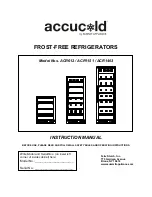
9
8.
Using the supplied washers and gaskets, attach the lower bracket (
10
) on the
opposite side of the cooler, but first attach the bracket axle to the door. Screw in
the bracket (
5
) on the opposite side of the cooler.
OPERATION PROBLEMS AND THEIR SOLUTIONS
(TROUBLESHOOTING). What if …
•
The appliance is plugged in to the mains but it does not work.
Check that
your house electricity supply installations are in order. Check that the plug is
correctly inserted into the electricity supply socket.
•
The noise has become louder.
Check that the appliance is standing stable, on a
level place. To make it level, regulate the front feet. Check if the appliance is not
touching any furniture, and that no part of the refrigeration system at the back part
of the appliance body is touching the wall. Pull the appliance away from any furniture
or walls. Check that the cause of increased noise isn’t due to bottles, cans or dishes
in the appliance that might be touching each other.
•
Water has appeared at the bottom of the refrigerator compartment.
Check
whether a thaw water channel space isn’t blocked. Clean the thaw water channel
space with a cleaner intended for that purpose.
•
Water has appeared under the appliance.
The thaw water collection tray has
slipped off the compressor. Place the tray on top of the compressor.
•
When the appliance door is opened, the rubber sealing gasket pulls out.
The
gasket is smeared with sticky foodstuffs (fat, syrup). Clean the sealing gasket and
the groove for it with warm water containing soap or dishwashing detergent and wipe
dry. Put the rubber sealing gasket back into the place.
•
High temperature in appliance, the compressor operation pauses are short.
Ascertain whether the appliance door/doors are shutting tightly, whether the door
wasn’t kept open longer than necessary when taking out or putting in foodstuffs or
whether a large amount of warm food was placed in the appliance.
•
The top of the appliance has condensation on it.
The ambient relative air
humidity is above 60 %. Ventilate the room where the appliance stands and if
possible remove the cause of the humidity.
TRANSPORT
THE MANUFACTURER WILL NOT BE RESPONSIBLE FOR ANY DAMAGE OF THE
APPLIANCE THAT RESULTS FROM NON-COMPLIANCE WITH THE INSTRUCTIONS
FOR TRANSPORTATION.
•
The appliance should be transported only in the vertical position.
•
When being transported, the appliance should be protected from atmospheric
conditions (rain, snow, dampness).
•
The appliance should be firmly secured in place while being transported, to avoid
slippage or any shocks in the transport vehicle.
•
If the appliance was transported not vertically, it may be connected to the
mains after 4 hours at least. If this is not done, the appliance compressor
may fail
.











































